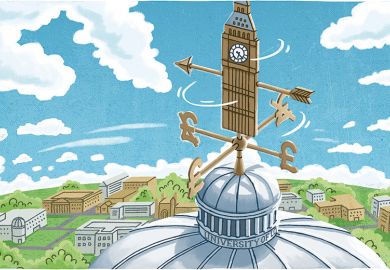England’s current system of fees and loans is unlikely to survive for long. The Labour Party is committed to outright abolition; for the Tories, Damian Green, the de facto deputy prime minister, has called for a “debate”, while universities minister Jo Johnson floats a “review”. It feels like Margaret Thatcher’s infamous poll tax a few months before its abolition.
International trends are also against high fees. A revolt against fees in public universities is sweeping the US, and the fitful attempts to introduce them in continental Europe have largely petered out.
So what replaces the 2017-18 fees of £9,250, repaid with 6.1 per cent interest? Much depends on whether anything can be salvaged from the existing system. My political sense is that if the universities and/or the government move swiftly to cut fee levels year-on-year – alongside some bloated overheads, notably the pay of vice-chancellors and other top staff – it might just be possible to continue with fees at around the pre-2012 level of £3,000.
If resentment festers and grows until the next general election, outright abolition is likely. A Labour victory would lead to this immediately. Given the popularity of its pledge to abolish fees in June’s election, Labour will stick to it next time under almost any leadership. Faced with another battle for the youth vote, the Tories are unlikely to want to fight Labour on fees, which means promising to slash them at the very least.
In an attempt to stem the electoral tide against fees, Theresa May presented herself during the campaign as Robin Hood, standing up for “poor” non-graduates against the begowned “rich” who would get a huge handout from the abolition of fees. The Tory media went along with this portrayal and it stuck, since Labour said virtually nothing about how it would pay for abolition. However, there is no reason for abolition of fees to be regressive. It depends what replaces the status quo.
The income that would be lost to the Treasury by complete abolition is estimated by the Institute for Fiscal Studies to be about £6.5 billion a year, allowing for the large savings to government from not having to subsidise the existing system, in which loans are written off (in whole or in part) for graduates on low incomes. Obviously, the more of the existing fee that survives, the smaller the shortfall would be. Yet whatever the gap, a substantial allowance should be made for the windfall that universities enjoyed from the trebling of fees in 2012, which gave them far more in fees than they lost in government teaching grants. Maybe no more than two-thirds of the income lost from fees will need to be replaced from other sources to maintain adequate university funding.
A second factor is what happens to overseas students. Universities currently raise nearly £4 billion in overseas student fees. This income has more than doubled in the past 10 years. Given the growing number of globally mobile students, it could increase substantially further without universities needing to reduce home student numbers.
By the time it comes to making good lost tuition fee income, the “black hole” needing to be filled by the Treasury is likely therefore to be in the low single figure billions.
It is fairly straightforward to fill this gap in a progressive way without the less well-off footing the bill.
Reversing last year’s cut in inheritance tax, which benefits families with the wealthiest estates, would alone save £1 billion a year. Reversing – or not proceeding with – the proposed above-inflation increase in the income threshold for the higher 40p rate of income tax, promised in the Conservative manifesto, saves another £1 billion a year.
The 40p rate is a fair approximation to a graduate tax. Only 14 per cent of income tax payers earn more than £45,000 a year, the higher rate threshold. Most of these are graduates; but even the non-graduates at this income level are very likely to have children who benefit from higher education. Each 1p addition to the 40p income rate raises about £1 billion, so a small rise in the 40p rate would probably fill the gap needed to keep the universities afloat.
However, none of these solutions raises enough to cancel the debt of those who have already acquired tuition debts. Figures of up to £100 billion have been quoted for that. I doubt if any future government will make it a priority to cancel this debt. Its motto is likely to be that of former Labour chancellor Denis Healey: when in a hole, stop digging. But that doesn’t mean filling in the existing hole.
Lord Adonis is a former education minister and was Tony Blair’s head of policy when the 2004 fees reform, which introduced fees of up to £3,000, was devised.
Register to continue
Why register?
- Registration is free and only takes a moment
- Once registered, you can read 3 articles a month
- Sign up for our newsletter
Subscribe
Or subscribe for unlimited access to:
- Unlimited access to news, views, insights & reviews
- Digital editions
- Digital access to THE’s university and college rankings analysis
Already registered or a current subscriber?







